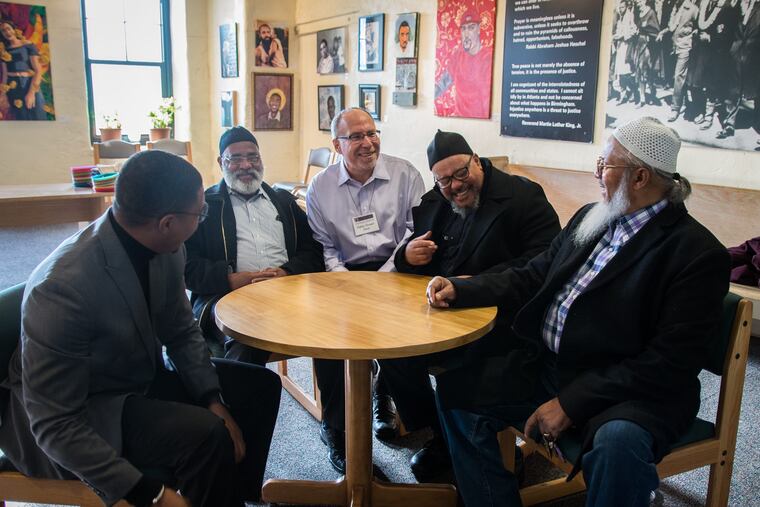At this year’s Human Rights Shabbat, a recommitment to faith prompted by shootings
"In the wake of Pittsburgh and the murders in Louisville and California we saw this as an opportunity to really come together and lift up the aspect of solidarity and human rights for everybody," said Rabbi Shawn Zevit, of Philadelphia's Mishkan Shalom synagogue.

At synagogues across the country Saturday, worshipers took time out to celebrate human rights and examine the state of those rights in the aftermath of a rash of racist and anti-Semitic incidents and shootings.
At Mishkan Shalom synagogue in Manayunk, the massacre that claimed 11 lives at the Tree of Life synagogue in Pittsburgh in October was among other high-profile shootings noted by those gathered for the annual marking of Human Rights Shabbat, a national event since 2008.
"In the wake of Pittsburgh and the murders in Louisville and California, we saw this as an opportunity to really come together and lift up the aspect of solidarity and human rights for everybody," said Rabbi Shawn Zevit, who has led Mishkan Shalom for six years.
In that spirit, Zevit invited Christian and Muslim clergy to the event, which featured hymns sung in Hebrew and down-home gospel led by the Rev. Nicolas O'Rourke of the Living Water United Church of Christ in Lawncrest.
The Rev. Mark Tyler of Mother Bethel AME Church on Sixth Street in Society Hill said the tragedies should motivate people of faith to work and speak against such violence.
"The time for us to stand together is when anybody in the community is attacked and hurt. We can't afford to wait until it comes to our front door," said Tyler, who, like Zevit, is a member of Power, an interfaith organization of 50 congregations that works for social change.
"If someone is being attacked at the border, if someone is being told they can't come to the country because they're Muslim, if someone is being denied lodging because of who they love, that's important to all of us. Anybody that's hurt, that's our issue," Tyler said.
While the turbulent times have been sobering, they have also resulted in some recommitting themselves to their faith, Zevit and others noted. "A lot of younger people have been coming and people with young kids, though not exclusively, and saying: 'I hadn't really thought about it, but I got to think of my identity now. I've not been connected to a community.' "
Ellen Tichenor, Mishkan Shalom board president, fought back tears as she recounted to the congregation that a friend of hers has a friend who began wearing a yarmulke for the first time in his life after the Pittsburgh slayings. "What he said about it is: 'This is my black skin.This is how people who cannot hide walk around, and I don't want to hide anymore.' "
Tichenor, 72, said this year's Human Rights Shabbat is a rebuke to a new form of violence. "It's not that violence hasn't been in this country; it's just that there's no shame about it. It's even more rampant now. I was involved in the civil rights movement. I think we thought we had done a piece of work that would not be undone. This Shabbat is about saying we're not going to let our humanity be cheapened by the type of hatred and violence that is being fostered in the country."
Created by T'ruah: The Rabbinic Call for Human Rights, a New York-based rabbinic human rights organization, the annual observance strives to educate members of the Jewish community and others about the link between Jewish values and universal human rights. The celebration, which takes place before International Human Rights Day, the yearly celebration of the passage of the Universal Declaration of Human Rights, is marked by adherents studying Jewish teachings concerning human rights, discussing modern-day human-rights struggles and celebrating the connection between universal human rights and Jewish values.
At Mishkan Shalom, groups of schoolchildren made posters to illustrate the meaning of human rights. One featured a green-and-blue globe. Another depicted clean water and shelter. Another featured foods that the children believe everyone should have access to, including fruit, vegetables — and pizza, the latter drawing laughs from the audience.
"Without a roof over our heads, food, and a decent job, what are we marching for?" Zevit said, affirming the children's artwork.
Although they are not Jewish, a small group of Villanova University students who attended the Human Rights Shabbat as part of a theology class said they found common ground with the Mishkan Shalom congregants.
"I'm a Catholic, and the problem of gun violence isn't really spoken about in church as profoundly as it is here, and I think it is really something that should be spoken about," said Kerri Weston, 20, a sophomore communications major. "So, it was really interesting to see them speak about it. It's something we don't want to talk about, but we should."
"I didn't expect to be, like, singing gospel worship songs at the service," said Samantha Mazzarelli, 22, a senior political science major. "I just came away really appreciating how you can pull these different traditions together and just celebrate religion and spirituality as a whole and be united and sort of move forward fighting for human rights."